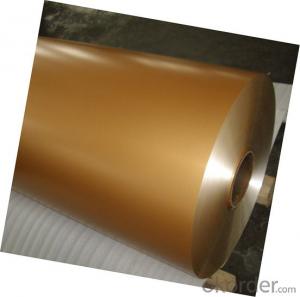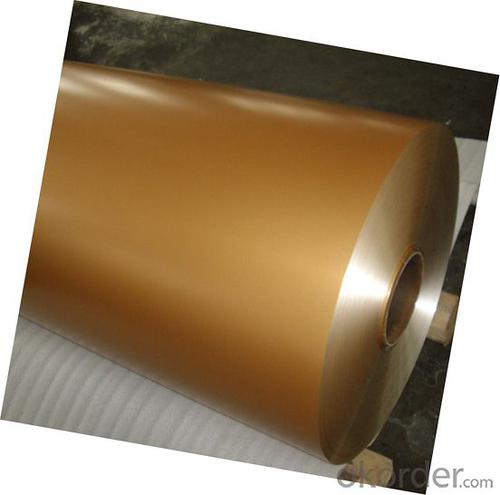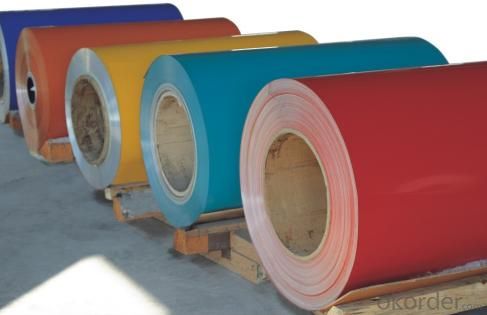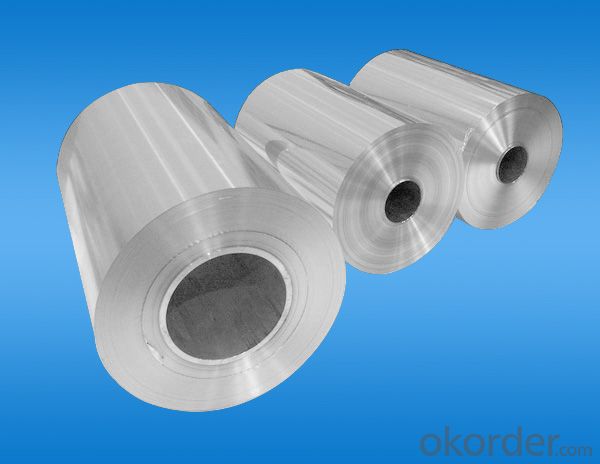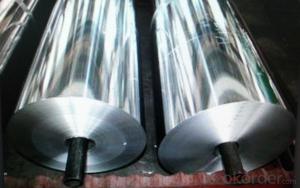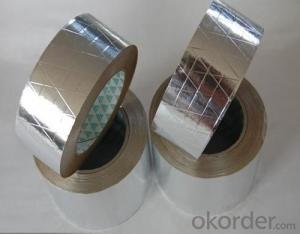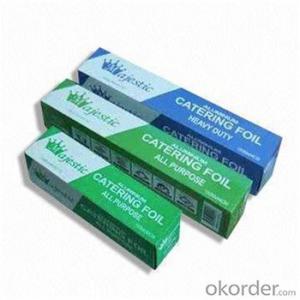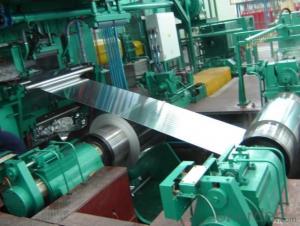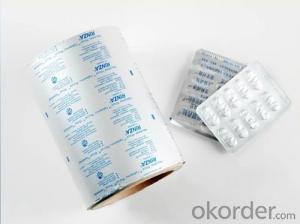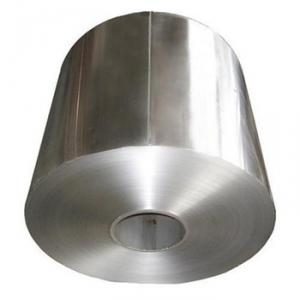Aluminum Sheets 3x3 - Household Aluminium Foil Jumbo Roll from China
- Loading Port:
- Shanghai
- Payment Terms:
- TT OR LC
- Min Order Qty:
- 5 m.t.
- Supply Capability:
- 9000 m.t./month
OKorder Service Pledge
OKorder Financial Service
You Might Also Like
Specification
Specifications
colorful aluminium foil for medicine bottle caps
1.alloy 8011 h14
2.thickness 0.17-0.21mm
3.used aluminium vial seals
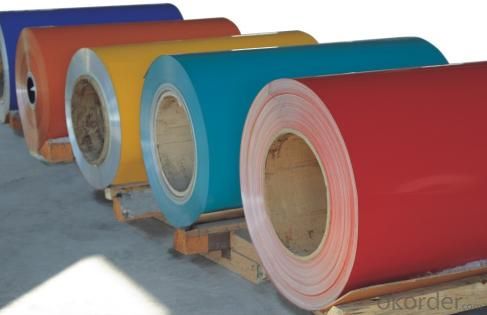
Lacquered aluminium strip for pharmaceutical caps | |
Alloy | 8011 |
Temper | H14 & h16 |
Thickness | 0.17-0.21mm |
Width | 30-800mm |
Earing | 2% max |
ID | 76mm and 152mm |
Tensile st | 135-155mpa |
eongation | 2.5-4% |
Surface Treatement |
|
Test item | Autoclave resistance , aceton test. Hgcl2 . Rigid test ect |
Application | Pharmaceutical caps . Vial seals ect |
MOQ | 3-5ton per size |
Packaging | Wooden stronger boxes |
Shipment | 25-30days after order and deposit |
Payment | TT or lc at sight |
CNBM is professional coating manufactuer and supply. We gurantee goods quality and very good service! | |
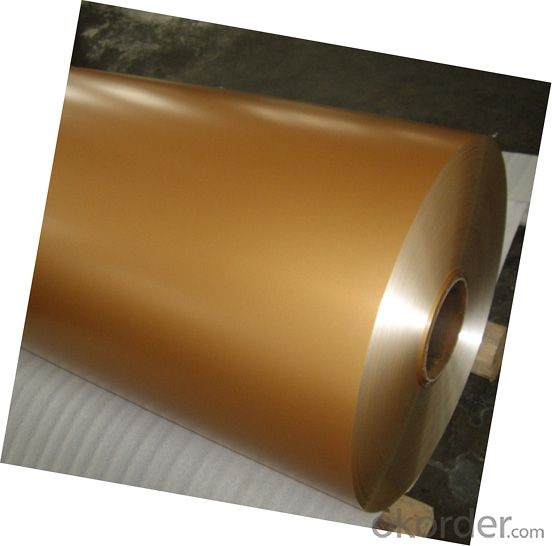
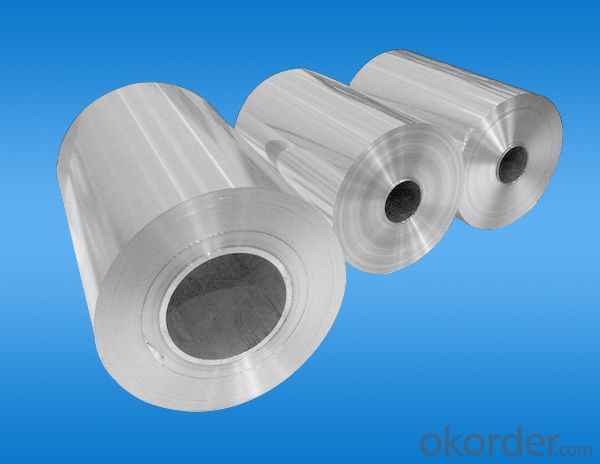
- Q: Do 101 aluminum sheets have any specific insulation properties?
- 101 aluminum sheets do not possess any distinct insulation properties, as aluminum is an efficient conductor of both heat and electricity, failing to offer protection against temperature extremes. Nevertheless, these sheets can serve as reflective surfaces, effectively bouncing back heat or light. To achieve insulation, it is necessary to incorporate supplementary materials like foam or fiberglass in conjunction with the aluminum sheets.
- Q: Is aluminum sheet recyclable?
- Indeed, aluminum sheet possesses a high recyclability factor. In fact, it ranks among the most sustainable and environmentally conscious materials available. This is due to its unique ability to be recycled endlessly without any compromise to its quality. The process of recycling aluminum sheet involves melting it down until it reaches a liquid state. Interestingly, this process requires far less energy than producing primary aluminum from raw materials. By engaging in the recycling of aluminum sheet, we not only preserve our precious natural resources but also play a crucial role in reducing greenhouse gas emissions and conserving energy. It has been estimated that recycling just one ton of aluminum sheet can save up to nine tons of CO2 emissions. Therefore, embracing the practice of aluminum sheet recycling is not only economically feasible but also a vital step in fostering a sustainable and eco-friendly environment.
- Q: Can aluminum sheets be perforated?
- Yes, aluminum sheets can be perforated. Perforation is a process that involves punching holes or creating a pattern of holes in a material. Aluminum is a versatile and malleable metal that can be easily perforated using various methods such as punching, drilling, or laser cutting. Perforating aluminum sheets can serve multiple purposes such as allowing for airflow, reducing weight, enhancing aesthetics, or creating filtration systems. The size, shape, and arrangement of the perforations can be customized to meet specific requirements and design preferences. Overall, aluminum sheets can be effectively perforated to enhance their functionality and visual appeal.
- Q: What is the corrosion resistance of 101 aluminum sheets in saltwater environments?
- 101 aluminum sheets are widely acknowledged to have excellent corrosion resistance in saltwater environments. Aluminum possesses inherent resistance to corrosion and when it encounters saltwater, it develops a protective oxide layer on its surface, which enhances its resistance to corrosion. This oxide layer functions as a shield, obstructing direct contact between the saltwater and the underlying metal, thereby decelerating the corrosion process. Nevertheless, it is crucial to acknowledge that prolonged exposure to saltwater can still result in some level of corrosion over time. Employing regular maintenance and applying protective coatings can significantly augment the corrosion resistance of 101 aluminum sheets in saltwater environments.
- Q: Can the aluminum sheets be used for manufacturing heat shields?
- Yes, aluminum sheets can be used for manufacturing heat shields. Aluminum is known for its excellent thermal conductivity and high heat resistance. It is commonly used in various industries, including automotive and aerospace, for manufacturing heat shields. Aluminum sheets can effectively reflect and dissipate heat, making them an ideal material for this purpose. Additionally, aluminum is lightweight and corrosion-resistant, making it a practical choice for heat shield manufacturing.
- Q: How strong is aluminum per square inch, and at the same time how light is the aluminum per square inch?
- we have large aluminium sliding doors and in the summer time they twist and will not open why is this.
- Q: What are the electrical conductivity properties of aluminum sheets?
- Aluminum sheets possess excellent electrical conductivity properties. Due to its low electrical resistance, aluminum is widely used in various electrical applications. It has a high conductivity rating, only slightly lower than that of copper, making it an effective conductor of electricity. This property allows aluminum sheets to efficiently transmit electrical current with minimal energy loss. As a result, aluminum is commonly utilized in power transmission lines, electrical wiring, and electrical connectors. Furthermore, aluminum's conductivity makes it suitable for applications that require heat dissipation, such as heat sinks in electronic devices. Overall, aluminum sheets are known for their favorable electrical conductivity, making them a preferred choice in numerous electrical and electronic applications.
- Q: Does it make any difference shiny side up, shiny side down when it comes to cooking with aluminum foil?
- The dull/shiny question was on the top of their list! Aren't you glad this answer is out in the open now?!
- Q: Are aluminum sheets suitable for HVAC applications?
- Yes, aluminum sheets are suitable for HVAC (Heating, Ventilation, and Air Conditioning) applications. Aluminum is a popular material choice for HVAC systems due to its various beneficial properties. Firstly, aluminum is lightweight, which makes it easier to handle and install in HVAC systems. This is particularly important for large systems that require a significant amount of material. Secondly, aluminum is highly resistant to corrosion, making it ideal for use in HVAC applications where exposure to moisture and condensation is common. This resistance to corrosion ensures the longevity and durability of the HVAC system, reducing maintenance and replacement costs in the long run. Additionally, aluminum has excellent thermal conductivity, allowing it to efficiently transfer heat or cold air throughout the HVAC system. This property helps to ensure efficient heating and cooling, reducing energy consumption and resulting in cost savings for the user. Furthermore, aluminum sheets can be easily formed and shaped to fit specific HVAC requirements, allowing for customized designs and precise installation. This versatility makes aluminum a preferred choice for ductwork, heat exchangers, and other components in HVAC systems. Overall, aluminum sheets are well-suited for HVAC applications due to their lightweight, corrosion resistance, thermal conductivity, and flexibility. These properties contribute to the efficiency, durability, and performance of HVAC systems, making aluminum a preferred material in the industry.
- Q: Can aluminum sheets be used for insulation purposes?
- Yes, aluminum sheets can be used for insulation purposes. They have a low thermal conductivity and can effectively reflect heat and cold, making them suitable for insulating applications in various industries such as construction, automotive, and packaging.
Send your message to us
Aluminum Sheets 3x3 - Household Aluminium Foil Jumbo Roll from China
- Loading Port:
- Shanghai
- Payment Terms:
- TT OR LC
- Min Order Qty:
- 5 m.t.
- Supply Capability:
- 9000 m.t./month
OKorder Service Pledge
OKorder Financial Service
Similar products
Hot products
Hot Searches
Related keywords
